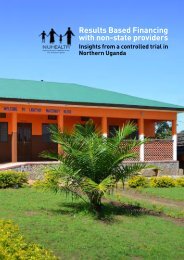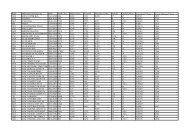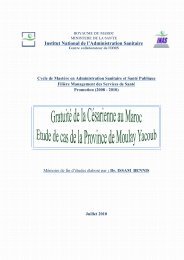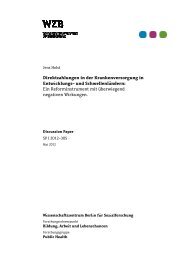Bellagio-Report-Vs-Apr-14
Bellagio-Report-Vs-Apr-14
Bellagio-Report-Vs-Apr-14
You also want an ePaper? Increase the reach of your titles
YUMPU automatically turns print PDFs into web optimized ePapers that Google loves.
lack of diversification, and a tendency for theyield from these resources to be captured bypolitical and economic elites, rather than beinginvested in broader-based developmentalgoods.The second framing condition (already impliedabove) is the shift in the global economiccentre of gravity eastwards and southwards.While the United States remains the strongesteconomy globally, projections estimate China’srise to this position in the foreseeable future.The financial meltdown of 2008, the deepindebtedness of the traditional centres of theworld economy and the continuing Eurozonecrisis have inhibited growth on the Africancontinent, but at the same time exposed therelative strength of the Asian economies and arange of other emerging countries, some inAfrica. Although Africa’s growth dipped fromaround 6% to 2.5% in 2009 (ADB, 2010), it’srecovery from these levels is already evident.The countries with the strongest GDPs tend tobe the resource-exporting countries (but tend tohave the least diversified economies), while themore diversified economies of Egypt, Tunisia,South Africa and Morocco are powerful enginesof growth on the continent. Ghana, Kenya andSenegal are diversifying quickly and theirinvestments in innovation are reflected in theirgrowing trade within the continent (McKinseyGlobal Institute, 2010; Swilling, 2010). It isclear that food will be increasingly seen asvaluable a strategic resource into the future asminerals and oil are. This is reflected not only inthe recent global price escalations, but also inhow some countries are buying up stretches ofthe best arable land in Africa in order to ensurebespoke supplies for their own populations. Theimplications of this shift in the global centre ofeconomic gravity includes a changing set ofprimary customers for Africa’s resources,together with a changing set of conditionalitiesfor the exchange of those resources. The termsof trade with China, for example, may be quitedifferent from those with Scandinavia. Similarly,Africa needs to see its trading partners (not onlyin terms of commodities, but the full range oftradables) increasingly located in the South, andon the African continent. What opportunitiesdoes this open for trade regimes more beneficialto the development and diversification of theeconomies in Africa, and in the South morebroadly? Finally, the current fragility of theeconomies of the US and the EU is alreadyhaving an impact on how these countries seetheir development relations with the South, notleast in the levels of development aid availablefor disbursement, but also in the purposes ofaid. There are implications here for thecharacter that these relationships acquire intothe future. For example, the DfID White Paperof 2009 speaks of ‘our common prosperity’, ‘ourcommon security’ and ‘our common climate’(Maxwell, 2009). Are we encountering an era inwhich capital (or at least some players)comports itself differently in the future, with agreater eye to more equitable development andsustainability? These shifting power gradientshave implications for how development projectsshould be conceived, and how they areevaluated. See for example the stance reflectedin the African consensus position ondevelopment effectiveness taken at Busan in2011 (AU and NEPAD, 2011).The third framing condition is the wave ofdemocratisation and citizen activism that is afeature of the recent history of the continent. Anunprecedented number of countries on thecontinent are conducting increasinglymeaningful multi-party elections, with growinglevels of social inclusiveness (UNECA, 2009).The political sphere in Africa is widelycontested and fluid, and although armedconflict and coercive strategies are still evident,electoral politics represent the predominantarena for contestation. Having said that, thephenomenon of the Arab Spring has vividlyillustrated the growing levels of citizen activismthat have arisen together with acceleratinglevels of urbanisation. The activism arises fromincreased expectations from the growing middleclasses, or from those with a sharper view of theinequities of wealth distribution (OECD, 2012).A study by the African Development Bank hasattributed this revolution in the Arab world,aside from a rejection of long-term politicalrepression, to the twin demands for jobs andeconomic justice. The study traces the growthof unemployment among relatively welleducatedyouth, as well as a decline in realwages in what was a “functional distribution ofincome away from labour” (ADB, 2012: 11).The ubiquity of ICTs, together with social mediaand the internet, contribute to a restructuring ofsocial order away from hierarchical structuresand towards social laterality and concomitantdemands for greater levels of accountability andgovernance transparency (Rifkin, 2011). Alliedto this is the phenomenon of resourcenationalism, voiced as both a popular demandand as a growing set of regulatory measures tobetter capture and redistribute the yield fromthe extractive industries (UNECA, 2012). Thelevels of militant activism currently underway inAfrican Thought Leaders Forum on Evaluation and Development, <strong>Bellagio</strong>, Nov 2012 24








